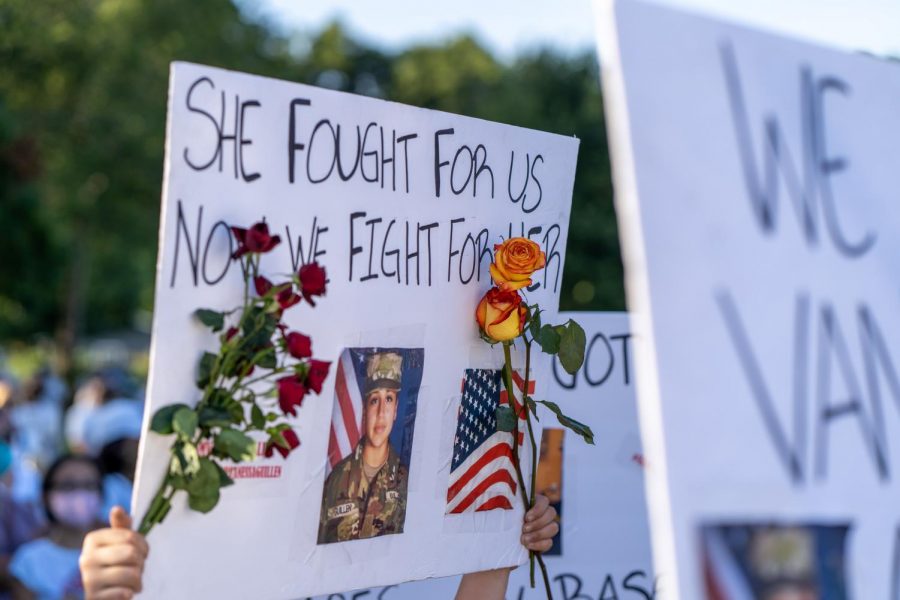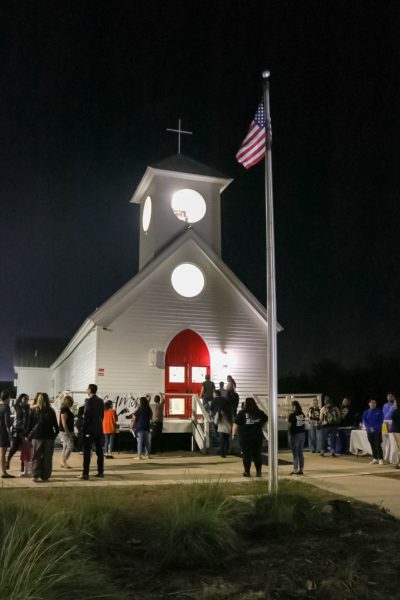Protestors seek justice for Vanessa Guillen at state capitol, push for changes in military
Protestors gathered outside the state capitol in a march for justice. Family and friends of Vanessa Guillen push for reform in the military.
Vanessa Guillen is a name many people have heard by now, especially Texans. Guillen was a 20-year-old military soldier who was allegedly murdered by her superior and alleged harasser, Spc. Aaron Robinson. Both were stationed in Fort Hood in Killeen, Texas.
According to the most recent information on the case, Robinson, 20, killed Guillen on April 22 in an arms room – taking inventory of arms was Guillen’s job at the military base – by bludgeoning her with a weapon from the room, most likely a hammer or axe. Robinson then picked up his girlfriend, Cecily Aguilar, later that night and the two allegedly dismembered Guillen’s remains and buried her in a shallow grave about 20 miles from Fort Hood.
Robinson’s phone was pinged in the same area where Guillen’s remains were found, making him a prime suspect in her death. Once Guillen’s remains were found, Robinson fled Fort Hood. As police surrounded him, Robinson killed himself.
On Sep. 7, Austinites took to the streets of downtown Austin to protest how Guillen’s case has been handled by marching to the Texas State Capitol. A state representative from El Paso, César Blanco, hopes to file a bill in Guillen’s honor next legislative session to “ensure criminal sexual assaults can be prosecuted in state courts to the full extent of the law, to hold offenders accountable outside of the military chain of command,” according to Blanco.
Protests were also held in San Antonio and Los Angeles, with protestors calling for justice for Guillen and her family. Many are angry and frustrated at the death of Guillen, which has been believed by some to have a connection to her alleged sexual harassment during her time in the military.
While senior military officials say that no evidence has been found connecting Guillen’s death to sexual harassment, many are still calling for more safety measures to be put in place for military soldiers who have been sexually harassed.
According to ArmyTimes, the murder and sexual harassment rates at the Fort Hood military base are higher than other installations across the force. In a survey distributed to 225 Fort Hood soldiers, one third of the 52 women surveyed reported being sexually harassed.
Those who were close to Guillen say that she talked about being sexually harassed by a superior at Fort Hood who allegedly followed her into the shower. She ultimately never reported it for fear of not being believed.
Just this year, eight soldiers have died on or near Fort Hood, with five of those deaths believed to have involved foul play.
According to the U.S. Army’s website, the army prioritizes preventative measures before behaviors “escalate into more serious offenses.” They enforce S.H.A.R.P. training, which stands for Sexual Harassment/Assault Response & Prevention.
Sexual assault can affect service members’ health. Survivors may develop chronic pain/fatigue, eating disorders, depression, PTSD, substance misuse and more.
At a congressional hearing on sexual assault in the military, Sen. Martha McSally, R-Arizona spoke on why she didn’t report her abuser while she was in the military.
“Like so many women and men, I didn’t trust the system at the time. I blamed myself. I was ashamed and confused. I thought I was strong but felt powerless. The perpetrators abused their position of power in profound ways.”












